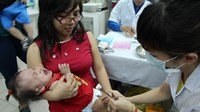Vietnam will offer pneumonia, diarrhea, HPV vaccines for free
Nguyen Tran Hien, chairman of the National Extended Vaccination Program, told Tuoi Tre that the Global Alliance of Vaccines and Immunization (GAVI) has agreed to cover the cost during the first several years before handing the costs off to the government.
The program will target pneumonia caused by streptococcus pneumoniae, or pneumococcus, a human pathogenic bacterium.
Hien said the three vaccines target viruses with high infection rates.
“56 percent of children hospitalized for viral diarrhea in Vietnam are infected with rotavirus, and pneumonia is a leading cause of deaths among children, with pneumococcus a prime cause of the disease. Vaccines for HPV can prevent a number of sexually transmitted diseases.”
Hien said rotavirus diarrhea and pneumonia are among the more worrying illnesses among unvaccinated individuals in Vietnam.
He said the three vaccines are considered effective and GAVI (a public-private alliance) are helping poor countries put them into common use.
The assisted countries are those with an average income of up to US$1,500.
“Vietnam is going to that limit, so the sooner we start the program, the greater the chance that we can receive assistance,” Hien told Tuoi Tre.
Vietnam’s average income in 2012 was $1,140, according to the General Statistics Office.
HPV shots are administered at hospitals for around $80 each, and each girl needs three.
Hien said GAVI will also sponsor a program to administer the measles-rubella shot for 23 million children between one and 14 years old this September.
He said measles is still a concern despite the availability of free vaccines. Thousands of children were infected over the past five months and more than a hundred of them have died, mostly of respiratory decline.
Diseases that carry subsidized vaccinations in Vietnam — tuberculosis, hepatitis B, whooping cough, tetanus and diphtheria — are all under control.
Vaccination against Japanese encephalitis has brought infections down from 60 percent of all meningitis cases in the early 2000s to 9.1 percent in 2013, Hien said.
“When we use vaccines, we have another tool to prevent diseases effectively.”


Comments are closed.